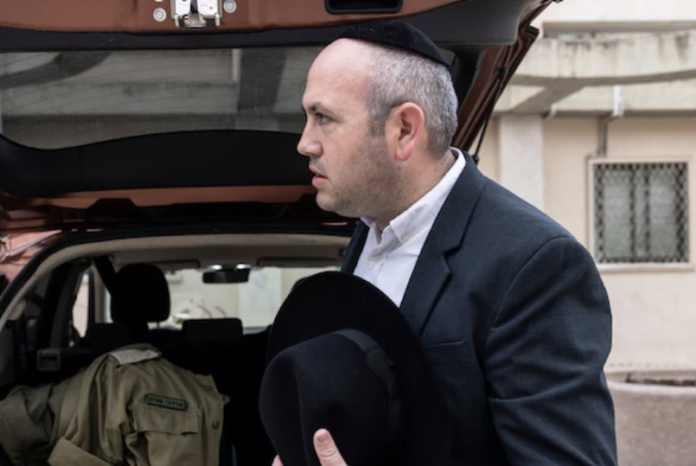36-річний соціальний працівник є одним із зростаючого числа ультраортодоксальних євреїв, або харедімів, які відреагували на напад ХАМАСу 7 жовтня, приєднавшись до ізраїльської кампанії з викорінення цього угруповання, іноді тихо, незважаючи на звільнення громади від військової служби.
Їхнє звільнення від обов’язкового призову вже давно є предметом суперечок у країні, де військова служба є невід’ємною частиною національної ідентичності. Це призвело до падіння уряду прем’єр-міністра Біньяміна Нетаньягу у 2019 році, що стало початком чотирирічної виборчої кризи.
Харедім категорично проти того, щоб їх змушували служити, на тій підставі, що вони повинні витрачати весь вільний час на вивчення Тори. Вони стурбовані тим, що молоді харедіми, яких відправили в армію, ніколи не повернуться до своїх релігійних обов’язків.
Їхній розмір і вплив змусили ізраїльських лідерів задовольнити їхні вимоги. Вони також були звільнені від дотримання національних стандартів освіти та сплати деяких податків.
Поспіх з вступом на військову службу, хоча й залишається табуйованим серед деяких харедімів, показує, як напад ХАМАС і війна Ізраїлю, в якій його війська вбили 21 320 і поранили 55 603 людини в Газі, змінюють, навіть об’єднують розрізнені сегменти цієї розділеної країни, в тому числі вздовж деяких з її найглибших ліній розлому.
«У нас є громада Хареді, яка легітимізує армію, громада Хареді знижує свою стигму до хлопчиків, які вступають на військову службу», — сказав Нечумі Яффе, викладач Школи соціальних і політичних досліджень Тель-Авівського університету. «У нас є громада Хареді, яка каже, що так, дуже важливо мати армію, і я б охочіше призивав на військову службу».
Яффе опитав Харедіма щодо їхнього ставлення до військових у березні 2022 року та ще раз після 7 жовтня. У 2022 році 35 відсотків повністю погодилися з тим, що вони повинні зробити свій внесок в оборону Ізраїлю. Після атак цей показник зріс до 49 відсотків.
Після 7 жовтня Армія оборони Ізраїлю доручила рабину Хареді вербувати з громади. 65-річний Рамі Равад служив у військово-повітряних силах Ізраїлю. Він зателефонував у WhatsApp. За кілька годин, за його словами, відгукнулося понад 400 людей. Невдовзі зареєструвалися бажаючі.
Обмін повідомленнями мав вирішальне значення, сказав Равад. Він запевнив кандидатів, які ще навчалися в єшиві або релігійній школі, що їм не доведеться кидати навчання. “Ідеологія Хареді не суперечить ідеї армії”, – сказав він. Тора містить розповіді про солдатів і війну. — Але їх не змусиш.
Хареді, мабуть, ніколи не були так відокремлені від ізраїльського суспільства, як 7 жовтня. Це була єврейська субота, а також радісне свято Сімхат Тори. Члени громади прокинулися від великої кількості сирен, ніж зазвичай, але оскільки вони утримуються від використання електроенергії в шабат, вони не могли дізнатися причину.
“Я не знав, що коли я танцював, інші плакали”, – Порат.
Коли Бенці Шварц вступив на військову службу, родичі надіслали йому електронною поштою проповіді, щоб висловити своє несхвалення. Шварц, якому майже 40 років, не навчений служити в бою, але він хотів би, щоб це було можливо.
Ізраїльська кампанія знищила більшу частину Гази. Понад 1,8 мільйона жителів Гази покинули свої домівки. Вони страждають від нестачі води, їжі та даху над головою, різко обмежують медичне обслуговування та перекривають електроенергію та зв’язок. Міжнародні гуманітарні організації попереджають про зростання голоду.
Шварц сказав, що всім серцем підтримує військові зусилля.
“Я не співчуваю жителям Гази, які прокинулися 7 жовтня і пішли, деякі з них на милицях, вбивати, ґвалтувати і катувати євреїв”, – сказав він. «У будь-якій релігії є чіткий принцип: «Хто прийшов убити тебе, встань раніше, щоб убити його».
Інші бачать більше нюансів, але кажуть, що в кінцевому підсумку це питання виживання. Громадянин Великої Британії Натан Раков, який більшу частину свого життя прожив в Ізраїлі, був прийнятий в армію і чекає на призначення на цю посаду.
“Будь-яка невинна людина, яка помирає, є болючою і несправедливою річчю”, – сказав він. «З іншого боку, цінність збереження мого життя, життя моїх дітей і моїх братів і сестер також висока — як людини, єврея і як релігійної людини».
Раков сказав, що наслідки 7 жовтня змусили його почуватися настільки ж патріотичним, як і релігійним. «Чи відчуваю я себе більш ізраїльтянином?» — запитав він. — Так.


